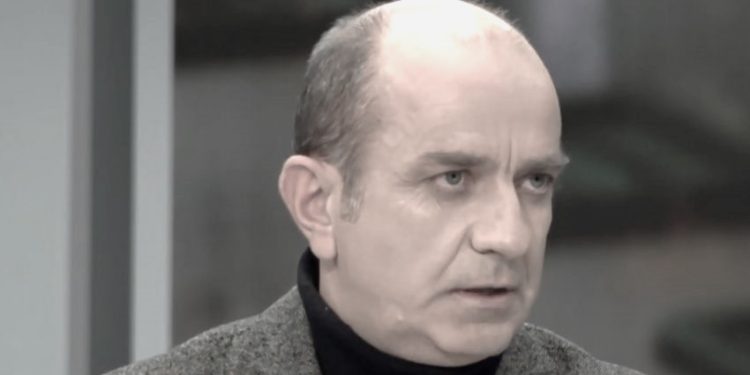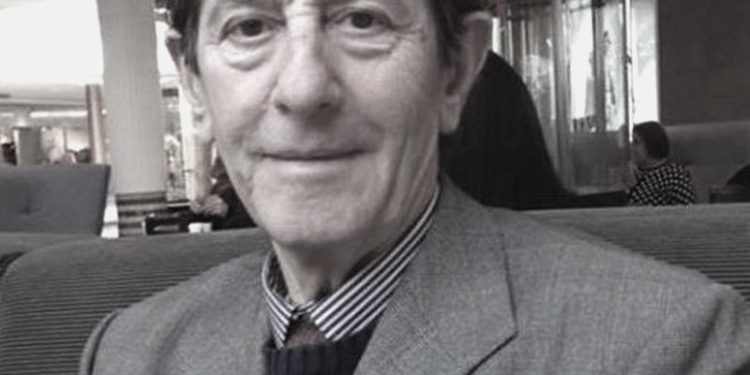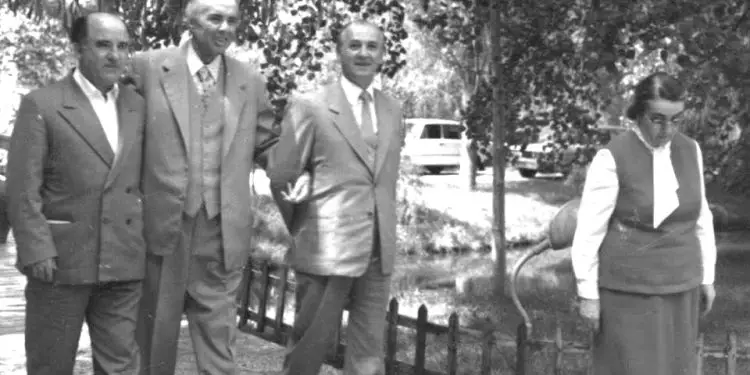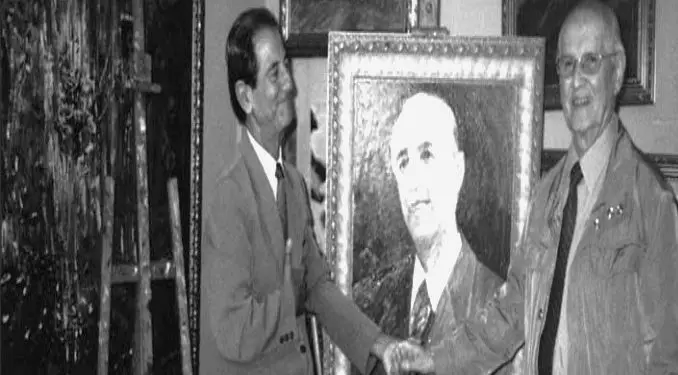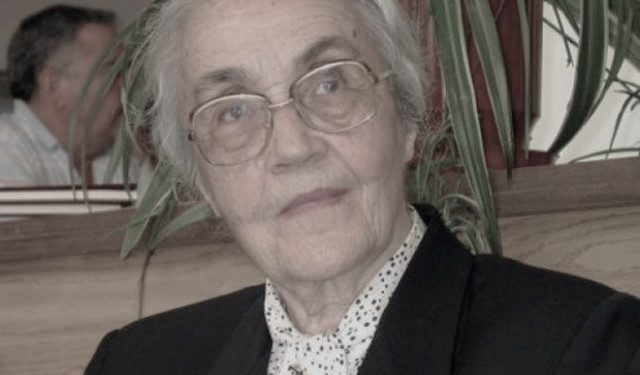By Aristir Lumezi
Part Three
Memorie.al/ Ramiz Alia’s former personal secretary, Guro Zeneli, in a long interview sheds light on the communication of the former senior leader of the Party of Labor of Albania with Mikhail Gorbachev, regarding the strategy decided at the meeting of communist parties in Katowice, Poland. According to Zeneli, Ramiz Alia, once a student at the Faculty of Philosophy in Moscow with Gorbachev, although he was invited to participate in this meeting, did not go, but he was sent to Tirana the material of this meeting and the decisions taken there. Zeneli, who was close to Ramiz Alia until the last moments of his life, says that after Ramiz was introduced to Gorbachev’s document, he discussed it with Foto Çami and began a deep reflection based on it, softening the class struggle, the accusations against religion, the lack of defense of Stalin’s figure and discussing more openly about the market economy.
Continued from the previous issue
Former Secretary of President Ramiz Alia, Guro Zeneli, recounts Alia’s broken relationship with Enver Hoxha’s widow, Nexhmije Hoxha. According to Guro Zeneli, their friendship was broken after the collapse of the monument to Enver Hoxha in February 1991, for which Nexhmije claimed that the government should protect it at all costs.
In his account, Zeneli states that; Ramiz Alia’s reaction to Nexhmije Hoxha was comforting, but also calming, telling her that; the protection of the monument by force could lead to great casualties, even to a civil war. But it seems that the broken relationship between Alia and Nexhmije Hoxha has also worsened with the arrest and prison sentence of the communist leader’s wife.
Afterwards, their relationship was completely severed, and even after being released from prison, Ramiz Alia sent Nexhmije, a mutual friend, to mediate for them to return to their old friendship. But Nexhmije rejected this attempt by Ramiz, leaving the relationship between them frozen. Guro Zeneli, a close person in the Alia family, remembers that in Ramiz’s funeral ceremony, no one from the Hoxha family participated in it, except for Ramiz Alia’s niece, Teuta, and her husband, Ilir Hoxha.
Mr. Guro, when did the “breakup” between Ramiz and Nexhmije happen?
The day Enver’s statue was toppled, an upset Nexhmije went to Ramiz’s office and said: “Hey comrade Ramiz, how come not one person was killed for Enver Hoxha, thousands of people swore by his name that they would spare their lives, if only he lived as long as the mountains…”?!
How did Ramiz respond?
Ramiz told her: “Nexhmije, doesn’t worry, Enver have been toppled, only the bronze has been toppled.” Ramiz told her; not to worry, because we will raise the bust again, but if one person were to be killed, a hundred more would be killed and what we are trying to do is to avoid the civil war that foreigners are trying to incite, at all costs. Nexhmije left Ramiz’s office, crying and since then, their relationship has not been the same.
What other reactions were there to the toppling of Enver’s bust?
At the meeting of the Central Committee of the Labor Party, the Ministry of Defense and the Ministry of Interior were sent to Ramiz, asking for the party’s role in protecting the monument to Enver. Ramiz told him: “The time is gone when the Party was the navel of the world”. At this meeting, Ramiz said that; no one should worry; why the statue of Enver was toppled, because we can erect busts and statues again.
The American journalist, whom I mentioned above, David Baider, who covered Balkan issues, said: “Ramiz Alia may have made many mistakes, but Ramiz Alia is not a murderer. He skillfully avoided the civil conflict in Albania during the change of the communist system”.
How were their relations, that is, Nexhmije with Ramiz, after the fall of the monument to Enver?
They were broken relations; it was”broken bread”. But Ramiz kept Nexhmije, giving her political support. At the June 12, 1991 Congress of the Albanian People’s Party, when the Socialist Party was created, Ramiz did not expel Nexhmije. The entire Political Bureau was expelled. But what I do know is that; after the fall of Enver’s monument, Nexhmije and Ramiz have had no further contact.
You say that there was no communication between Ramiz Ali and Nexhmije Hoxha. Was Nexhmije at Ramiz’s death and his funeral ceremony?
No, no, she wasn’t, nor was any of her children. I don’t remember them being there, not even to offer condolences afterwards. She didn’t even make a phone call of condolence to Ramiz’s children, except for Ilir, who is Ramiz’s brother’s son-in-law. Ramiz didn’t visit Nexhmije after prison. But Ramiz made an effort to improve relations with Nexhmije.
Through a mutual friend, he sent Nexhmije a message asking them to leave behind the grudges of the past and continue to be friends, for the good memories they had together, since the time of the War and during the years of socialism, but Nexhmije did not accept this message, saying that; I do not expect any message from Ramiz. It seems that Nexhmije did not fully understand Ramiz, who throughout his life had avoided a strong clash at every moment.
After the prison that the bureaucrats put him in, it seemed like they were cold towards Ramiz Ali, and they even considered him a traitor. Have they communicated with each other?
No, there was coldness, a withdrawal from them, towards Ramiz.
Did you know, at Ramiz’s request that Nexhmije Hoxha and her children were to leave Albania?
Liljana Hoxha and her children fled abroad, while Nexhmija did not move and did not want to move. It was an idea for Enver’s family to go to Canada, because the Communist Party of Canada was waiting for them. Nexhmija did not want to leave. I do not know that Ramiz asked Nexhmija to leave with all the children abroad.
Was the arrest of Nexhmija Hoxha related to some kind of compromise to save the collapse of the stability government?
In fact, it was a condition of the Democrats for the imprisonment of Nexhmija and the dismissal of the director of the Television so that the stability government would not fall.
Did Ramiz accept it in silence?
Ramiz had nothing to do, he accepted it in silence, for the sake of the stability of the country, because it was not known what collapse and consequences the collapse of the stability government could create, in the state of the country’s economy.
Ramiz, did you sign?
No, no. Ramiz did not sign the arrest of Nexhmije. In fact, Ramiz, after his imprisonment, had a concern. He asked me to find someone so that he could clarify who had given the order for Nexhmije’s arrest. I suggested that Fadil Cani meet him. I went with Fadil to Ramiz’s house, who asked him how the event of Nexhmije Hoxha’s arrest had developed.
Ramiz had a great burden left in the public eye, her arrest, since the bureaucrats had also described him as a traitor, who allowed the arrest of Enver Hoxha’s wife. Fadil told Ramiz that Nexhmije was arrested on the orders of Sali Berisha and Azem Hajdari. It is not clear what role Ylli Bufi, who was Prime Minister at the time, played. But as such, he should have executed the power given to him by law.
While Nexhmije Hoxha was in prison, was there any visit or any envoy to clarify this misunderstanding between Ramiz and her. Did you go to meet Nexhmije in prison on behalf of Ramiz Ali?
Never, neither Ramiz nor I. Even when Ramiz was in prison, I never went. I asked his daughter, Zana, when I could go and visit him in prison. He had told his daughter that he did not want anyone to come to him. He was very spiritually dead and did not want me, or others who had worked with him as president, to see him in the cell. I never went to him, because he did not want to either.
No one went to him. At the beginning of the prison, the government imposed total isolation on Ramiz. They did not allow him books, a pencil to write with, a notebook, anything, or communication with other prisoners. But there is also a human story, Ramiz’s prison. The prison director was Tanush Mulleti, Qazim Mulleti’s nephew. He had an interesting history with Ramiz.
In 1942, when there was a demonstration in Tirana and Ramiz was arrested, along with a friend, at the prefect of Tirana, Qazim Mulleti, a friend of Qazim’s wife intervened and Ramiz, along with the other arrestee, were released with his signature. After the liberation, Ramiz had power and returned this honor that he had done to Qazim Mulleti, to his family. I don’t know exactly how. When Ramiz was in prison, Tanush helped him a lot, in a humane way, contrary to the orders for isolation that had been given to Ramiz.
Even when the prison was dissolved in 1997, due to the fear and chaos that had engulfed the country, because there was also the risk that they could physically eliminate him, Tanush took him from prison in his car and sent Ramiz home. Ramiz constantly reminded of this fact, highlighting the human side, even though Tanushi and Ramiz belonged to different social classes.
There was a kind of differentiation in the internal relations of the Hoxha family, because one of the sons’ daughters-in-law, Teuta, was Ramiz’s niece, while Liljana did not have such a background. Did this fact contribute to a kind of internal jealousy?
I think that Liljana upset the balance in that family. I do not know if there was any quarrel, but I know that Liljana was more pampered by Enver, he kept her closer. I cannot say what assessment Nexhmija had of Liljana, but at that time, it was said that Nexhmija did not want her to be the son’s daughter-in-law. But Enver, as the most principled, was the one who accepted the girl his son loved.
How were Ramiz’s relations with Liljana Hoxha?
I noticed the bad relationship between Liljana Hoxha and Ramiz Ali, even during the time when Ramiz was the president of the People’s Assembly and Liljana was the deputy director of the Albanian Telegraphic Agency. Ramiz asked me to go to ATSH and get the news for internal use, which was circulating at the highest level of the state apparatus, it was information of particular importance, which ATA processed and distributed to the leaders of the state.
I met the director, and he told me that Liljana was in charge of it. Liljana and I did not know each other, but we greeted each other in the corridors of the institutions. So, I was not a stranger. I knocked on Liljana’s office and asked for the news on behalf of comrade Ramiz. Liljana said to me in a strange tone: “What do you need this news for?”?! I told her that; we need it, as much as you need it.
This was after the death of Enver Hoxha?
Yes, yes, Enver had died at that time. I was impressed by the tone she used, a kind of dismissive tone. I know that Liljana was being treated medically at that time; she had some kind of problem, which I don’t know where it came from. Maybe from the big name she had received, after becoming the bride of Enver Hoxha’s son and she couldn’t bear this weight…?!
Did Ramiz express himself against the attack made on him by Liljana Hoxha?
No, no, I had never heard him express anything against Liljana. I knew Ramiz Ali very well; he could never stoop to the level of Liljana’s accusations. /Memorie.al




